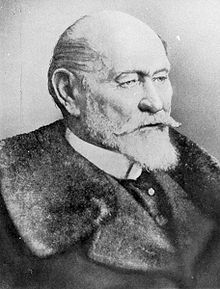Wilhelm Oechelhäuser

Justus Wilhelm Oechelhaeuser senior (Born August 26, 1820 in Siegen ; † September 25, 1902 in his villa "Belmonte" near Niederwalluf ) was a German businessman , politician and business manager . From 1852 to 1856 he was mayor of the city of Mülheim an der Ruhr . He was best known through his subsequent work as General Director of the German Continental Gas Society (Contigas) in Dessau and as the founder of the German Shakespeare Society .
Live and act
Justus Wilhelm Oechelhäuser was the son of the marriage of the Siegen paper manufacturer Johannes Oechelhäuser and his second wife Marianne Charlotte (Marie-Lotte) born. Schenck. He was one of his father's 14 children from two marriages.
After completing his commercial training, Oechelhäuser took up various activities in the economy and from 1848 in the ministerial administration. In 1852 he was elected mayor of the city of Mülheim an der Ruhr, in the same year he became a member of the Prussian House of Representatives , but left again a year later. He was mayor until 1856 before Hans Victor von Unruh appointed him director of the Deutsche Continental Gasgesellschaft founded a year earlier (with the business area of generating and selling town gas) in Dessau, which he held until 1890.
From 1878 to 1893 Oechelhäuser was a member of the German Reichstag . The reform of stock corporation law and the new GmbH law went back to his initiative.
The subsidiary Elektro Zentrale Dessau was founded as early as 1886 and built the second power station in Germany. From 1888, Conti began developing gas engines under its General Director Oechelhaeuser and brought Hugo Junkers to its design office for this purpose .
Oechelhaeuser founded the German Shakespeare Society in Weimar on April 23, 1864 . In 1883 he accepted the Anhalt title of nobility for his sons.
Together with Junkers, his son Wilhelm von Oechelhäuser jun. (1850–1923) In 1889 the research institute for gas engines . One of the first opposed piston engines was built there in 1892 . Wilhelm von Oechelhäuser jun. followed his father in 1890 as General Director of Contigas . His second son, Adolf von Oechelhäuser, was an art historian and taught as a professor at the Technical University of Karlsruhe .
Oechelhäuser was an active freemason . He held the office of master of the chair of the Dessau Lodge Esiko to the rising light .
Fonts
- Shakespeare's dramatic works. Weimar 1878, 7 volumes
- Introductions to Shakespeare's stage plays. 3rd edition, Minden 1895
- Shakespeareana. Berlin 1894
- The economic crisis. Berlin 1876 (digitized: urn : nbn: de: s2w-11833 )
- The disadvantages of the stock market and the reform of the stock corporation legislation. Berlin 1878
- The tariff reform of 1879. Berlin 1880
- The worker question. Berlin 1886
- Ideas for founding a German Shakespeare Society. Victories 1863
- The social responsibilities of employers. 2nd edition, Berlin 1887
- Daily social questions. 2nd edition, Berlin 1889 (digitized: urn : nbn: de: s2w-9445 )
- The German-East African Central Railway. Memorandum. Berlin 1899
- The appreciation of Shakespeare in England and Germany. Lecture given in Weimar on April 23, 1869 at the 5th General Assembly of the German Shakespeare Society. ( Digitized from HAAB Weimar)
literature
- Ilse Barleben : Mülheim ad Ruhr. Contributions to its history from the city elevation to the founding years. Mülheim an der Ruhr 1959, pp. 135-189.
- Eckhard Hansen, Florian Tennstedt (Eds.) U. a .: Biographical lexicon on the history of German social policy from 1871 to 1945 . Volume 1: Social politicians in the German Empire 1871 to 1918. Kassel University Press, Kassel 2010, ISBN 978-3-86219-038-6 , p. 110 f. ( Online , PDF; 2.2 MB).
- Franz-Rolf Krapp: Mülheim. Path of a city on the Ruhr. A little history of the city from the beginning to the present . Mülheim an der Ruhr 1967, pp. 164–167.
- Eugen Lennhoff, Oskar Posner, Dieter A. Binder : Internationales Freemaurerlexikon . Revised and expanded new edition of the 1932 edition, Munich 2003, ISBN 3-7766-2161-3 .
- Wilhelm Mollat: Wilhelm Oechelhaeuser (1820–1902). In: Rheinisch-Westfälische Wirtschaftsbiographien , Volume I. Aschendorff, Münster 1931, pp. 107–122.
- Öchelhäuser, Wilhelm von. In: Meyers Großes Konversations-Lexikon. 6th edition, Volume 14, Leipzig 1908, p. 891.
- Bernd D. Plaum: Oechelhäuser, Justus Wilhelm. In: New German Biography (NDB). Volume 19, Duncker & Humblot, Berlin 1999, ISBN 3-428-00200-8 , pp. 421-423 ( digitized version ).
- Walter Thomas : Wilhelm Oechelhaeuser, founder of the German Shakespeare Society. A presentation. City administration of Siegen, Siegen 1964.
Web links
- Wilhelm Oechelhäuser in the database of members of the Reichstag
- Literature by and about Wilhelm Oechelhäuser in the catalog of the German National Library
- Ministerial officials and members of the Federal Archives Commissions (PDF file; 55 kB)
- Graduates from the Gymnasium am Löhrtor ( Memento from October 4, 2010 in the Internet Archive )
- Mülheim's mayor from 1808 until today
Individual evidence
- ↑ Justus Wilhelm von Oechelhäuser - connection of gas and electricity industries, gwf-Gas + Energie, accessed on October 5, 2018
- ↑ Eugen Lennhoff, Oskar Posner, Dieter A. Binder: Internationales Freemaurerlexikon. Revised and expanded new edition of the 1932 edition, Munich 2003, ISBN 3-7766-2161-3 .
- ↑ Printed in: Collection of sources for the history of German social policy 1867 to 1914 , III. Department: Expansion and differentiation of social policy since the beginning of the New Course (1890–1904) , Volume 4, Workers' Law , edited by Wilfried Rudloff, Darmstadt 2011, No. 56.
| personal data | |
|---|---|
| SURNAME | Oechelhäuser, Wilhelm |
| ALTERNATIVE NAMES | Oechelhäuser, Justus Wilhelm (full name) |
| BRIEF DESCRIPTION | German economic manager and politician (NLP), MdR |
| DATE OF BIRTH | August 26, 1820 |
| PLACE OF BIRTH | Wins |
| DATE OF DEATH | September 25, 1902 |
| Place of death | Niederwalluf |

